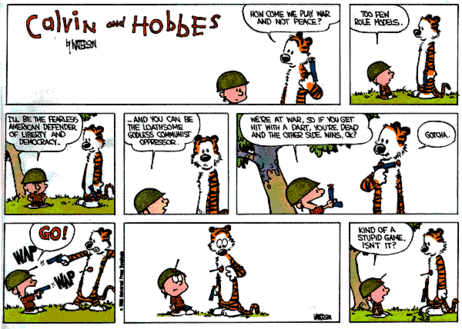
When I was seven, my mother did the worst thing I could conceive of: she took my Calvin and Hobbes books away from me. Why, why would she do such a horrible thing, I asked her at the time, probably kicking and screaming and waving my tiny fists.
It was a very simple answer: I was acting too much like Calvin.
Little did my mother know, taking away my comic books for a little while would do nothing to cure my obsession for Calvin and Hobbes. Oh sure, I stopped dressing up as Stupendous Man and giving the baby-sitter a hard time; I simply got more subtle. I went ahead and took the lessons from Bill Watterson’s masterpieces and made them a part of my life. Not only that, I took it a step further and made them a part of my military leadership style.
Which maybe explains a lot of things.
Throughout my career, people have asked me where I draw leadership or strategy lessons from. Most people expect me to say “Clausewitz,” or “Patton,” or “Sherman.” They are quite surprised when I say, “Calvin and Hobbes.”
Lesson 1: Go Outside
Calvin and his tiger, Hobbes, spend a lot of time outside: on the wagon, on the sled, building snowmen, climbing trees, causing mayhem, and dwelling on the facts of life. Too much of the modern military revolves around being inside: filing reports, conducting death by PowerPoint, tracking metrics, or just trying to get a Department of Defense computer program to work. It’s easy to get lost in the morass of paperwork, so getting outside is vital. Grab your ruck and head out with your soldiers; do some land navigation; get back to field problems. Our wars won’t be won by your excellence with Slide Master in PowerPoint. Get outside, get dirty, and make some memories for your soldiers. They want to train, it’s why they joined.

Lesson 2: Have a Good Rant
Sometimes the Army just gets to be too much for us. Similarly, life can be too much for Calvin. He uses rants and soliloquies to Hobbes to clear his soul. I’ve used this technique countless times after a particularly trying field exercise or staff meeting, where I feel that the rage in my chest will explode through and incinerate the nearest field grade officer. Finding a friend and a closed space, I give vent to all the frustrations I have. With everything off my chest, I can get back to the business at hand and not be weighed down by emotions.
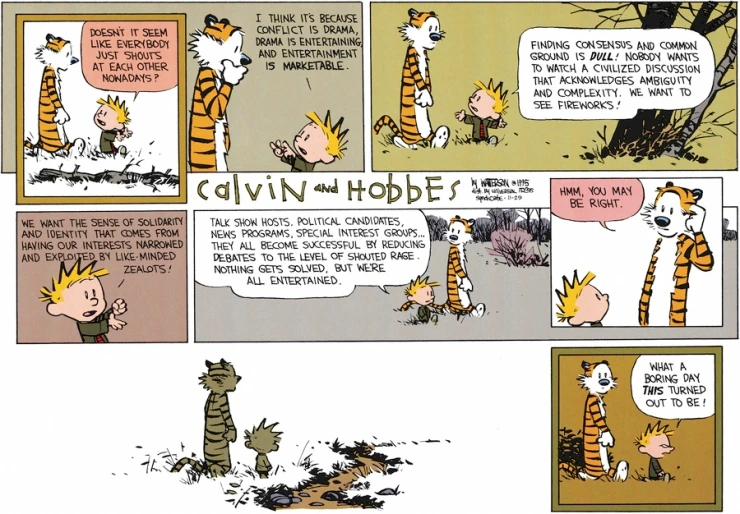
Lesson 3: Don’t let Reality Get you Down
We’re in a fairly stressful profession. That being said, if we take ourselves too seriously we run the risk of becoming egotistical and putting ourselves on a higher plane than our fellow citizens. A sense of humor goes a long way towards keeping us normal as well as not depressed by the situations we can find ourselves in. Calvin and Hobbes both believe in humor as an antidote to reality. So should you.

Lesson 4: Imagination is Important
Calvin has perhaps one of the most wild imaginations ever. From duplicating himself, to time travel, to transmogrifying, to, well, to imagining that his toy tiger is real (disclaimer: Hobbes is real). His imagination colors his entire life, helping him overcome boredom, and adapt to every situation. Similarly, military leaders need to be imaginative. Perhaps having imaginary friends is not quite the answer, but keeping an open and innovative mind is important for all leaders. Don’t try to duplicate your platoon sergeant, though; they will not appreciate it.
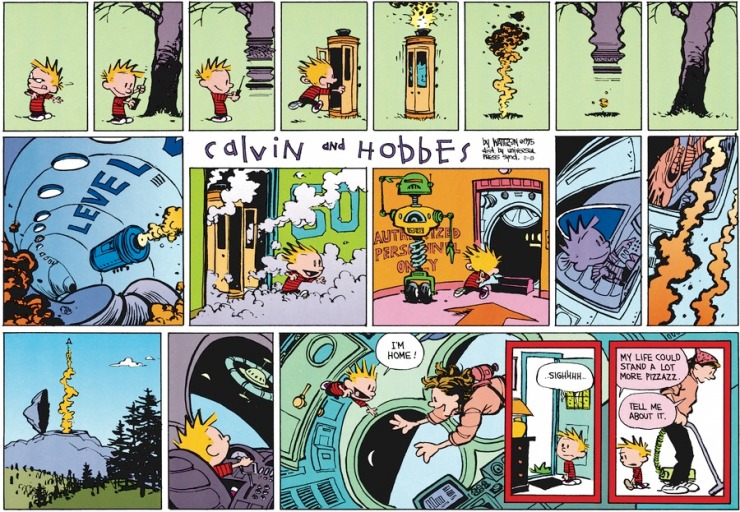
Lesson 5: You’re Nothing Without a Friend
Calvin and Hobbes provide the perfect balance to their friendship. Calvin is angry, mischievous, and imaginative; Hobbes is cynical, realistic, and believes (like his namesake) in the silliness of mankind. Together they make a perfect team, often fighting, often collaborating, always developing each other. No man is an island, nor can leaders be friendless. We need the mutual support of our peers to balance our opinions and temper our views. We also need that one person we can count on to back us up when we do something dumb, like make last minute edits to the command and staff slides that replace the transitions with clips from “Bill and Ted’s Excellent Adventure.”
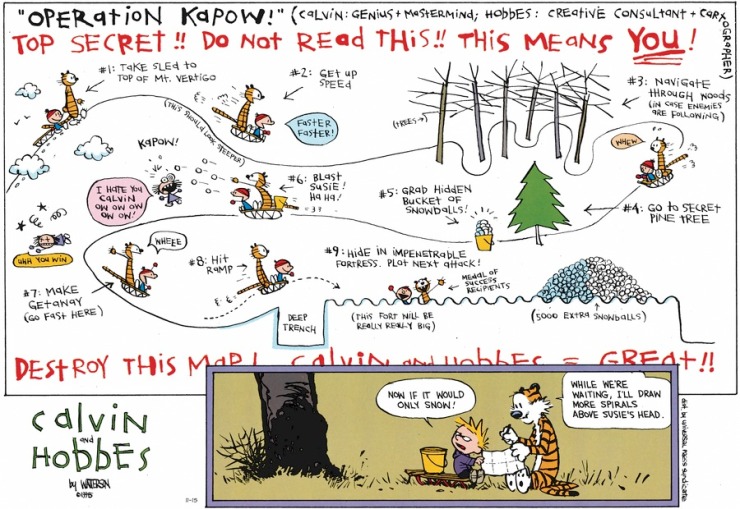
Lesson 6: Philosophy can be Fun
Bill Watterson loved planting philosophical Easter eggs into his comics. As just one example, the character of Miss Wormwood is named after a devil in C.S. Lewis’ Screwtape Letters. Of course, as children, we loved the funny jokes and drawings that Watterson made. Adulthood and college released a whole new layer of humor that Watterson had buried. Watterson proved that philosophy can be fun and useful, as opposed to what is often presented as dry and boring material (seriously, the Nicomachean Ethics are boring as sin). However, basic philosophical ideas, especially ethics, can provide a lot of potential growth for military leaders. Plus, having a Kantian zinger can give you a smug and pretentious feeling during staff meetings.

Lesson 7: Have an Adventure
Think back to why you joined the military. Chances are, love of country and a desire to serve are somewhere on that list. I’d also hazard to guess that driving a tank/flying a helicopter/firing a machine gun/seeing the world were on that list. There’s a part of everyone that desires an adventure in the world. Calvin and Hobbes most definitely feel that way. Their exploring expeditions in the back yard quickly turn into adventures of the highest order. Life without adventure is simply bland. Let’s always keep that in mind, lest we turn the military into just another day job with no passion.
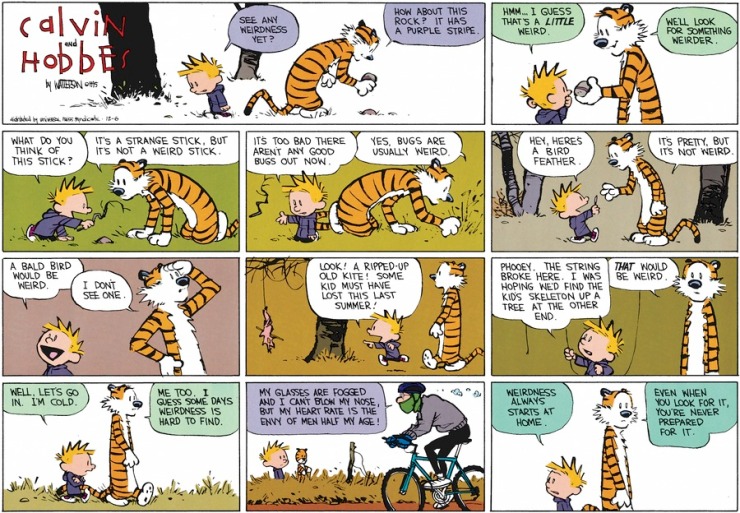

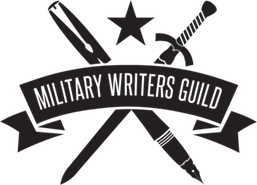


Reblogged this on MANTA Piece and commented:
Good advice.
LikeLike
I think following these steps would help many units solve their retention, height weight and other personnel/training problems.
LikeLike
HAHA! Good Stuff for Officers…An NCO’s mantra: Work.
LikeLike
Reblogged this on Lorwynd's Thoughts and commented:
Calvin & Hobbes is a great comic strip. I have several of the compilations and my kids love them, as well. As the Angry Staff Officer mentioned, Bill Waterson frequently managed to sneak life lessons into the strips…some for the kids, some for the grown-ups.
LikeLike
Endeavor to recruit Hobbes: an anthropomorphic tiger could be very useful in the field!
LikeLiked by 1 person
One more lesson is learned is from the great game of Calvin Ball. Have a plan, be ready to execute the plan…then be ready make it work when everyone else wants to you follow their special rules, policies, guidelines, general orders, etc, etc, etc…
LikeLiked by 2 people
This is so timely it’s a bit frightening. My wife just took Calvin and Hobbes away from my seven year old, for the same reason. It was fun, for a while at least, to see the comic through his eyes (what he thought was funny, for example).
Great piece, good advice.
LikeLike